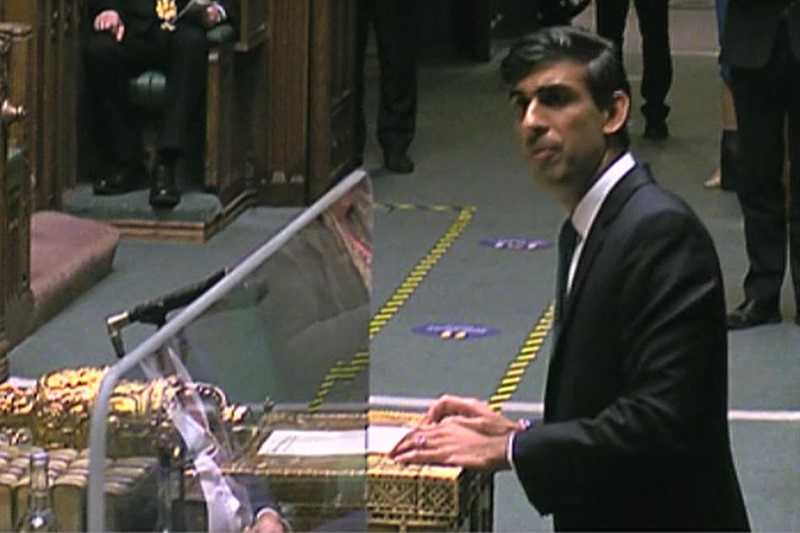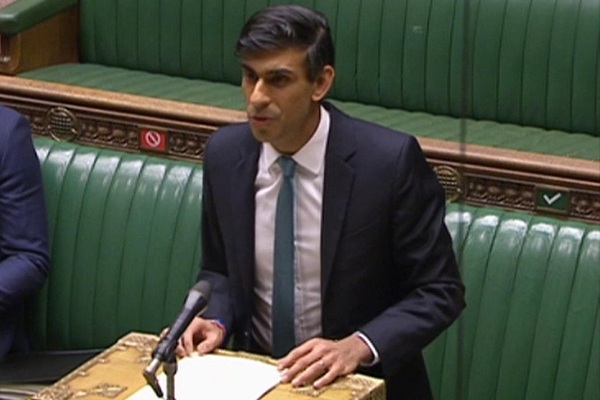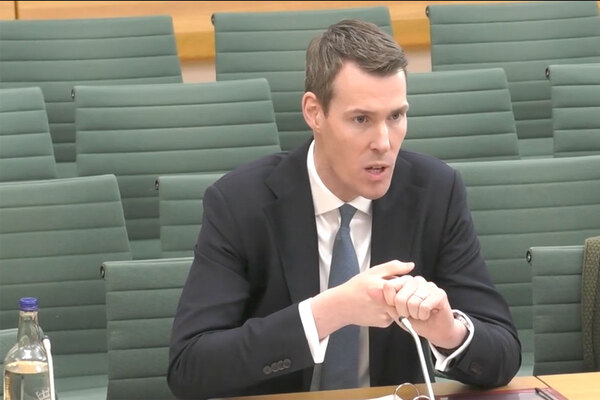Budget 2021: how the sector reacted to Rishi Sunak’s housing announcements
Chancellor Rishi Sunak today revealed his Spring Budget, which is aimed at helping the country recover from the economic turmoil caused by the COVID-19 pandemic.
There were key giveaways to new homeowners, with a three-month extension of the stamp duty holiday and a new mortgage guarantee system for homeowners who are able to raise a 5% deposit when purchasing a home.
Mr Sunak also confirmed that the £20-a-week uplift in Universal Credit, which has been in place throughout the pandemic, will also be extended, following months of lobbying by charities and housing groups.
So how have housing sector figures responded to the announcements?
Kate Henderson, Chief Executive of the National Housing Federation, says: “This budget is an important step in helping the country get back on its feet, as we navigate our recovery from the pandemic.
"Housing associations see every day how the universal credit uplift provides much needed relief for those living on the lowest incomes - so its short-term extension is welcome. This extra £20 a week helps families buy enough food to feed themselves and pay their rent.
"That said, we are concerned that families and children will face the same risk of financial hardship in 6 months’ time, when the effects of the crisis will still be felt.
It’s good to see the government bring forward exemptions to the shared accommodation rate, ensuring independent living is more affordable for people under 25 who have experienced homelessness and care leavers.
"This will also help people to move on from emergency accommodation more easily. Extra funding to support survivors of domestic abuse is also welcome news and we’ll look forward to seeing more detail on this.
"The announcement of a new MMC taskforce is positive, as well as the focus on helping people get onto the housing ladder. We must not forget for those on the lowest incomes who cannot afford to buy their own home, building more social housing in the coming years will also be crucial to recovery.”
Fiona Fletcher-Smith, chief executive of L&Q, said: “The housing sector will play a vital role in rebuilding and levelling up Britain’s economy after the pandemic, and we are delighted to see the government acknowledge this in today’s Budget.
“L&Q provides housing of all tenures for people on a range of incomes. As a charitable organisation our priority will always be social rented housing, but we fully appreciate that many people aspire to homeownership. Today’s announcements about the mortgage guarantee scheme and extending the stamp duty ‘holiday’ are very welcome.
“The housing sector will play a vital role in rebuilding and levelling up Britain’s economy after the pandemic, and we are delighted to see the government acknowledge this in today’s Budget”
“We are also very pleased that the chancellor has extended the furlough scheme and the uplift to Universal Credit.
“Coupled with additional investment in apprenticeships and traineeships, this will be a timely boost for many of our residents who have struggled during the pandemic.”
“Not-for-profit housing associations like L&Q reinvest all of our surpluses to improve existing homes, create jobs and support growth through investment in new housing, sustainable communities, infrastructure and climate action.
“The biggest challenge facing our sector is the building safety crisis. The £5bn funding previously announced for the remediation of dangerous cladding is important, but this crisis is about more than just removing cladding.
“L&Q has committed £250m to building safety works and launched one of the UK’s largest building safety inspection programmes, but as a registered charity we cannot shoulder the full costs of remediation, particularly for buildings we did not build. We would welcome further government support to protect leaseholders and housing associations.”
James Prestwich, our director of policy and external affairs: "This Budget provided an opportunity for government to set out how it hopes to rebuild the country following the COVID-19 pandemic. Few would understate the scale of the challenge facing government and with many sectors of the economy hit particularly hard by coronavirus, we weren’t expecting this to be a ‘housing budget’.
“That said, we would have liked to have seen a much greater focus on a housing-led recovery, which we believe represents the best way for government to drive growth, help meet its ambitious climate change targets, create highly skilled jobs and alleviate the chronic housing shortage.
"On the detail, we believe there remains a clear need to sustain the £20 a week Universal Credit uplift beyond the six months announced by the chancellor, and we’ll continue to make the case to government that they should look to mitigate the risk of this ending at a time when the economy is likely to remain fragile.
“The £12bn for a UK infrastructure bank will be valuable, although this doesn’t address the vital action required to upgrade the energy-efficiency of Britain’s housing stock and help tackle the climate emergency.
“Investment for housing has been focused on helping people into home ownership with a guarantee for 95% mortgages that will be welcome for those able to afford that option, but will not assist the many households unable to make the step into homeownership or those living in the rented sector."
Mark Perry, chief executive of Vivid, said: “We welcome the government’s decision to extend the £20-a-week increase in Universal Credit that was put in place after the onset of the pandemic. Amongst our customers, cases have increased by 3,605 since 23 March 2020, to a total in February 2021 of nearly 8,000, due to reductions in income or job losses, and it’s impacting many more people who’ve never needed financial support before.
“We’re here to provide money and benefits advice, as well as wider tenancy support and well-being services to as many people as possible who need help.
“Both the stamp duty extension and mortgage guarantee scheme will be welcomed by many, but what we really need in this country is increased funding to support the building of more affordable housing”
“However, we’d still urge the government to make the £20 uplift permanent as part of a rethink of how the welfare system supports people, as we know Universal Credit is not enough to live on. Even with the uplift, many are facing extremely difficult choices between paying for rent, food or heating.
“Both the stamp duty extension and mortgage guarantee scheme will be welcomed by many, but what we really need in this country is increased funding to support the building of more affordable housing. The supply of truly affordable housing, including social rented housing, is more important than ever given the difficult financial circumstances many more people now find themselves in, and there remains a critical shortage.”
Olivia Harris, chief executive of Dolphin Living, said: “It is absolutely right that the government continues to focus on protecting jobs in London, especially within the key sectors of hospitality and tourism, as we hopefully approach the end of the pandemic.
“We are calling on the chancellor to commit to a once-in-a-generation expansion of affordable housebuilding within London. This must include a significant proportion of intermediate rental housing for those critical workers who are unable to afford local market rents”
“However, as we look to the longer-term recovery it is more important than ever that those working within these industries, and our city’s vital key workers, have access to housing which is both affordable and located close to their place of work.
“Therefore, we are calling on the chancellor to commit to a once-in-a-generation expansion of affordable housebuilding within London. This must include a significant proportion of intermediate rental housing for those critical workers who are unable to afford local market rents upon whom London relies, as part of the overall pledge to support the capital’s social and economic recovery post the pandemic and level up the city.”
Jon Sparkes, chief executive of Crisis, said: “It is very disappointing to see the housing support announced today is limited to home buyers. Hundreds of thousands of renters in arrears are facing eviction in a matter of weeks and must not be forgotten. We also desperately need more social housing, while a lack of further investment in housing benefit will push more people into poverty and put them at risk of homelessness.
“We welcome the extensions to the Universal Credit top-up and the Job Retention Scheme, but the UK government must go further. With the UK facing up to the economic impact of the pandemic and unemployment on the rise, we need to see an ambitious approach to preventing and ending homelessness. A safe and secure home provides dignity but also a vital foundation to those seeking work, so preventing homelessness is essential in supporting our national recovery.
“Last year the UK government’s bold emergency action showed homelessness is not inevitable, but that progress is at risk of being undone if further action is not taken now.”
Ben Beadle, chief executive of the National Residential Landlords Association, said: “The chancellor’s pledge to do whatever it takes to support those affected by the pandemic will ring hollow for thousands of tenants and landlords across the country.
“The government has admitted that private tenants have been hardest hit by the pandemic, and figures show that most of those in arrears are unable to access emergency housing support from local authorities.
“Despite this, the chancellor has failed to provide the sector with the financial support needed to pay off rent debts built as a consequence of the virus.
“The chancellor’s pledge to do whatever it takes to support those affected by the pandemic will ring hollow for thousands of tenants and landlords across the country”
“Without help to get arrears cleared, many tenants face the prospect of losing their homes and having damaged credit scores, which will undermine the government’s efforts to help generation rent become generation buy.”
Phil Bayliss, CEO of later living at Legal & General, said: “As Britain emerges from the pandemic over the coming months, extending the stamp duty holiday will help sustain a strong property market amid the worst economic downturn in 300 years.
“Importantly, the extension ensures a more efficient use of Britain’s existing housing stock can continue, by incentivising older homeowners living in larger properties to downsize. These homes can be put to much better use by first-time buyers and growing families but, at present, nearly nine million bedrooms in the homes of older people are lying empty.
“Ultimately, we hope that the holiday might one day inspire the scrapping of the levy altogether. Not only would this inject much-needed liquidity into the market, it would also help first-time buyers, second-steppers and young families climb up the property ladder.”
Matthew Pratt, chief executive of Redrow, said: “Overall, today’s Budget gives hope for the UK’s recovery, and we welcome the boost in funding for apprenticeships, which will help encourage a vital stream of talent into the construction industry. The stamp duty holiday extension will be welcome news to those buyers caught up in the home buying process and who may have otherwise missed out on a saving, and the element of tapering between June and September will also be welcome to a number of new market entrants.
“However, in the medium-term and beyond October, we would like to see wholesale reform of this tax, as stamp duty outside of the current holiday is a barrier to people moving home, and it shouldn’t be. Facilitating mobility is especially important to the UK’s recovery as we move out of the COVID-19 lockdown and people find themselves needing to move due to job changes and other important life stage reasons.
“In the medium-term and beyond October, we would like to see wholesale reform of this tax, as stamp duty outside of the current holiday is a barrier to people moving home, and it shouldn’t be”
“Home moves should be encouraged, not least because each transaction acts as a catalyst for wider consumer spending in the economy such as on soft furnishings, new kitchens and bathrooms in the second-hand market, and a host of tradespeople. Recent research puts the net contribution each housing transaction makes to wider GDP spending at a significant £9,500.
“Historically stamp duty was not a significant contributor to Treasury coffers, but it became more onerous from the mid-1990s onwards, and a 10% and 12% band was introduced for higher-value homes in 2014. Stamp duty is also inconsistent with other property taxes and schemes, particularly when it comes to the new Help to Buy regional caps, and the upper threshold value of properties under the new mortgage guarantee scheme. Simplicity is to be strived for.”
Nicholas Harris, Stonewater chief executive, said: “Before today’s announcement, we had 40 transactions aiming to complete ahead of the March deadline with 12 of these at real risk of not completing in time to benefit from the stamp duty holiday.
“When originally set the deadline of 31 March was in line with other incentives to stimulate the UK economy, but increasingly in recent weeks it has become obvious that a number of sales expected to complete in time wouldn’t meet this deadline.
“Today’s extension will be a huge relief to both in-train buyers expected to complete this month, and at least another 10 sales in progress at the moment that could benefit from the extension, which will no doubt make their first property purchase more financially attractive. This will particularly be the case for those customers in more affordable parts of the country where the purchase price falls into the lowest stamp duty bracket.”
“Since the stamp duty holiday announcement last year, we have been running a campaign to further incentivise customers who are in a position to staircase and could benefit from the stamp duty holiday to do so. This has included waiving the standard £240 admin fee and offering £250 cash back on completion.
“As a result of this campaign, we’ve had 33 customers staircase and have a further 18 staircasing transactions currently with solicitors that are aiming to complete before the end of March. The three-month extension will enable us to support an additional 19 staircasing transactions to benefit from the stamp duty holiday, should they all complete as expected.”
Tracy Harrison, Chief Executive of the Northern Housing Consortium, said: “We are encouraged by the Chancellor’s recognition that the North can play a pivotal role in the economic future of the UK. The Treasury relocating to Darlington, naming three northern freeport locations and the establishment of the UK Infrastructure Bank will all have a positive knock-on effect for our sector.
“The opening up today of the Levelling-up Fund along with over £1bn of additional money for the Towns Fund, £456m of which is heading to the North, is good news for Northern communities who have historically been excluded from the lion’s share of funding.
“However, we noticed the absence of the troubled Green Homes Grant from today’s announcement. If it has been scrapped, we’d encourage Government to re-invest any unspent money from the grant in retrofitting the North’s social housing - a measure that we have established will not only help Northern regions achieve Net Zero targets but provide substantial economic stimulus too.”
Sign up for our daily newsletter
Already have an account? Click here to manage your newsletters














